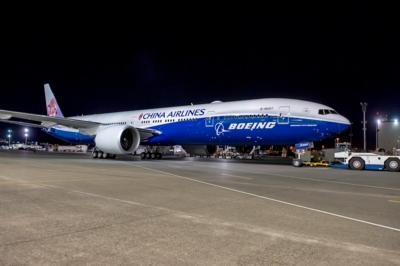Fri, Jun 28, 2024
China’s CAAC Pauses Deliveries to Analyze Revised Cockpit Voice Recorder
Boeing finally got some good news from back east, hearing that Chinese regulators are approving their widebody aircraft for importation again.

That should help them clear out its backlogs of 777 and 787s waiting to be delivered to customers in China, but the 737 Max family remains held up. The widebody Boeings didn't get to enjoy their delivery window for too long, being shut out from 2019 to only a couple weeks before New Year 2024. Only a few months passed until the Civil Aviation Administration of China announced that it would again suspend entry of new Boeing aircraft into the country. Deliveries were apparently halted this time over reviews needed for the 25-hour cockpit voice recorder, and the lithium battery that comes with it.Rumor has it that the 737 Max holdup will be lifted next month, allowing Boeing to clear out dozens of aircraft waiting for delivery to China. So far, since the beginning of the year, Boeing has managed to deliver about two dozen aircraft to Chinese clients, after ending last year with 85 waiting to be shipped out to their eastern clientele.

It's a little odd that the CAAC didn't approve of the new CVR Boeing now ships with its planes. The new unit meets the provision of the recent FAA reauthorization bill that demands all new aircraft come equipped with a cockpit voice recorder boasting a 25-hour retention span. The idea of a 25-hour minimum made its way into European rules a decade prior, but the FAA has only now been granted a mandate to establish its own framework to institute the same. Recent near-hits and mishaps have really driven home the point of longer cockpit recording systems, particularly with the embarrassment surrounding the highly visible Alaska Airlines MAX 9 flight that headlined for months earlier this year. After the aircraft landed, nobody on the ground staff had remembered to pull the breaker for the CVR, meaning the unit overwrote the entirety of the incident flight, losing crucial information and context right as the investigation began.
Other regulators, like the FAA and the EASA had no problem approving it for use, and the track record of duty-spec lithium batteries used in professional (and expensive) American products certainly doesn't give any reason to expect spontaneous combustion. Unfortunately the tight-lipped CAAC doesn't really say much about it to the public, leaving some to wonder whether it really was a simple objection to a new and unapproved battery, or a famously intrusive government making sure their rivals aren't shipping a tattletale system of their own.
More News
Decision Altitude (DA) A specified altitude (mean sea level (MSL)) on an instrument approach procedure (ILS, GLS, vertically guided RNAV) at which the pilot must decide whether to >[...]
Aero Linx: T-34 Association, Inc. The T-34 Association was formed in July 1975 so that individuals purchasing then military surplus T-34As had an organization which would provide s>[...]
As He Released The Brakes To Begin Taxiing, The Brake Pedals Went To The Floor With No Braking Action Analysis: The pilot reported that during engine start up, he applied the brake>[...]
“Legislation like the Mental Health in Aviation Act is still imperative to hold the FAA accountable for the changes they clearly acknowledge need to be made... We cannot wait>[...]
Also: IAE Acquires Diamond Trainers, Army Drones, FedEx Pilots Warning, DA62 MPP To Dresden Tech Uni The danger to the flight training industry and our future pilots is clear. Dona>[...]
 ANN's Daily Aero-Term (12.08.25): Decision Altitude (DA)
ANN's Daily Aero-Term (12.08.25): Decision Altitude (DA) ANN's Daily Aero-Linx (12.08.25)
ANN's Daily Aero-Linx (12.08.25) NTSB Final Report: Piper PA-31T3
NTSB Final Report: Piper PA-31T3 Aero-News: Quote of the Day (12.08.25)
Aero-News: Quote of the Day (12.08.25) Airborne-Flight Training 12.04.25: Ldg Fee Danger, Av Mental Health, PC-7 MKX
Airborne-Flight Training 12.04.25: Ldg Fee Danger, Av Mental Health, PC-7 MKX




